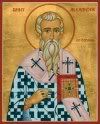He (Adam) ate of the forbidden fruit. This is how man's original sin is revealed to us. Christ, the New Adam...begins by fasting. Adam was tempted and he succumbed to temptation; Christ was tempted and He overcame that temptation. The results of Adam's failure are expulsion from paradise and death. The fruits of Christ's victory are the destruction of death and our return to paradise. … It is clear…that in this perspective fasting is revealed to us as something decisive and ultimate in its importance. It is not a mere "obligation," a custom; it is connected with the very mystery of life and death, of salvation and damnation. ... In the Orthodox teaching, sin is not only the transgression of a rule leading to punishment; it is always a mutilation of life given to us by God. It is for this reason that the story of the original sin is presented to us as and act of eating. For food is means of life; it is that which keeps us alive. But here lies the whole question: what does it mean to be alive and what does "life" mean? For us today this term has a primarily biological meaning: life is precisely that which entirely depends on food, and more generally, on the physical world. But for the Holy Scripture and for Christian Tradition, this life "by bread alone" is identified with death because it is mortal life, because death is a principle always at work in it. ... In itself food has no life and cannot give life. Only God has Life and is Life. In food itself God-and not calories-was (in Paradise) the principle of life. Thus to eat, to be alive, to know God and be in communion with Him were one and the same thing. The unfathonable tragedy of Adam is that he ate for its own sake. More than that, he ate "apart" from God in order to be independent of Him. And if he did it, it is because he believed that food had life in itself and that he, by partaking of that food, could be like God, i.e., have life in himself. To put it very simply: he believed in food, whereas the only object of belief, of faith, of dependence is God and God alone. World, food, became his gods, the sources and principles of his life. He became their slave. ... Hunger is that state in which we realize our dependence on something else-when we urgently and essentially need food-showing thus that we have no life in ourselves. It is that limit beyond which I either die from starvation or, having satisfied my body, have again the impression of being alive. It is, in other words, the time when we face the ultimate question: on what does my life depend? And, since the question is not an academic one but is felt with my entire body, it is also the time of temptation. Satan came to Adam in Paradises; he came to Christ in the desert. He came to two hungry men and said: eat, for your hunger is the proof that you depend entirely on food, that your life is in food. And Adam believed and ate; but Christ rejected that temptation and said: man shall not live by bread alone but by God. He refused to accept that cosmic lie which Satan imposed on the world, making that lie a self-evident truth not even debated any more, the foundation of our entire world view, of science, medicine, and perhaps even of religion. By doing this, Christ restored that relationship between food, life, and God which Adam broke, and which we still break every day. What then is fasting for us Christians? It is our entrance and participation in that experience of Christ Himself by which He liberates us from the total dependence on food, matter, and the world. ...fasting is the only means by which man recovers his true spiritual nature. ... Fasting is the real fight against the Devil because it is the challenge to that one all-embracing law which makes him the "Prince of this world." Yet if one is hungry and then discovers that he can truly be independent of that hunger, not be destroyed by it but just on the contrary, can transform it into a source of spiritual power and victory, then nothing remains of that great lie in which we have been living since Adam. ...without the corresponding spiritual effort, without feeding ourselves with Divine Reality, without discovering our total dependence on God and God alone, physical fasting would indeed be suicide. ...we need first of all a spiritual preparation for the effort of fasting. It consists in asking God for help and also in making our fast God-centered. We should fast for God's sake. We must recover a religious respect for the body, for food, for the very rhythm of life. All this must be done before the actual fast begins so that when we begin to fast, we would be supplied with spiritual weapons, with a vision, with a spirit of fight and victory. ...one must still remember that however limited our fasting, if it is true fasting it will lead to temptation, weakness, doubt, and irritation. In other terms, it will be a real fight and probably we shall fail many times. But the very discovery of Christian life as fight an effort is the essential aspect of fasting. A faith which has not overcome doubts and temptation is seldom a real faith. No progress in Christian life is possible, alas, without the bitter experience of failures.
Tuesday, November 15, 2005
Apropos to the Advent fast
Subscribe to:
Post Comments (Atom)


No comments:
Post a Comment